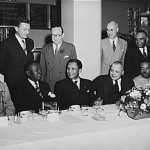Brave Afghani Women Protest Law Change
Did you see this article in the New York Times this morning, about the 300 women protesting a new law that would give men in the Shiite minority community virtually complete control over the lives of their wives? The NYT describes the law this way:
The law, approved by both houses of Parliament and signed by President Hamid Karzai, applies to the Shiite minority only, essentially giving clerics authority over intimate matters between women and men. Women here and governments and rights groups abroad have protested three parts of the law especially.
One provision makes it illegal for a woman to resist her husband’s sexual advances. A second provision requires a husband’s permission for a woman to work outside the home or go to school. And a third makes it illegal for a woman to refuse to “make herself up” or “dress up” if that is what her husband wants.
And the protest itself:
The women who protested Wednesday began their demonstration with what appeared to be a deliberately provocative act. They gathered in front of the School of the Last Prophet, a madrassa run by Ayatollah Asif Mohsini, the country’s most powerful Shiite cleric. He and the scholars around him played an important role in the drafting of the new law.
“We are here to campaign for our rights,” one woman said into a loudspeaker. Then the women held their banners aloft and began to chant.
The reaction was immediate. Hundreds of students from the madrassa, most but not all of them men, poured into the streets to confront the demonstrators.
“Death to the enemies of Islam!” the counterdemonstrators cried, encircling the women. “We want Islamic law!”
The women stared ahead and kept walking.
A phalanx of police, some of them women, held the crowds apart.
As a refugee law professor, dramatic confrontations like this one always lead my thoughts back to the legal definition of “refugee,” and the absence of “gender” among the enumerated categories of persecution. For instance, the U.S. defines “refugee” as a person “unable or unwilling to return to . . . [his or her home] country because of persecution or a well-founded fear of persecution on account of race, religion, nationality, membership in a particular social group, or political opinion . . . .” I have considered thearguments, legal and practical, against trying to add “gender” to the Refugee Convention’s definition as a separate ground. But I think I disagree. For that reason and so many others, it seems like time to revisit the convention and protocol that established the international definition of “refugee.”
Back to the main point, the courage of these Afghani women is inspiring. And the NYT article suggests that the law change might possibly be halted before becoming enforceable.
Cross-posted at feministlawprofs.

